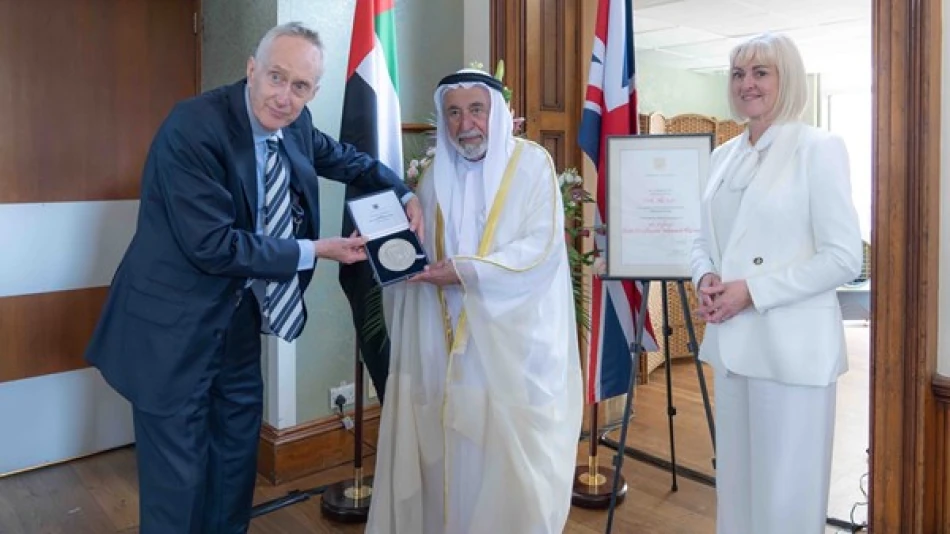
Sharjah Ruler Honored with Exeter University's Honorary Presidency Award
Sharjah Ruler Makes History as First Honorary President of University of Exeter
Sheikh Dr. Sultan bin Muhammad Al Qasimi, Ruler of Sharjah, has received an unprecedented honor from the University of Exeter—becoming the first person in the institution's history to be awarded the title of Honorary President. The recognition underscores a four-decade academic partnership that has reshaped Middle Eastern studies in British higher education and established Sharjah as a bridge between Arab scholarship and Western academia.
A Historic Recognition Rooted in Decades of Partnership
The ceremony at Exeter's Reid Hall marked more than just personal recognition for Sheikh Sultan, who earned his PhD in History from the university in 1985. It celebrated a transformative relationship that began in the 1980s when the young Emirati scholar first arrived as a student and has since evolved into one of the most successful academic partnerships between the Gulf region and British higher education.
Sir Michael Barber, Exeter's Honorary President, presented the award in recognition of Sheikh Sultan's "distinguished contributions to education and scientific research," as well as his role in fostering cultural dialogue between civilizations. The honor comes at a time when Middle Eastern studies face renewed global attention amid shifting geopolitical dynamics.
The Al Qasimi Building: A Physical Testament to Academic Diplomacy
During the visit, Sheikh Sultan unveiled plans for the Al Qasimi Building at the Institute of Arab and Islamic Studies—an architectural project that reflects the growing sophistication of UAE-UK educational cooperation. The building, designed as a scholarly hub for students and researchers, will feature discussion spaces, gardens, and specialized facilities for studying Arab and Islamic civilization.
This initiative builds on Sheikh Sultan's earlier establishment of the Institute of Arab and Islamic Studies in 2001, which houses the Arab World Documentation Unit and the Emirates Collection. These resources have become invaluable for researchers studying Gulf history, particularly as the region's geopolitical importance has grown alongside its economic diversification efforts.
Strategic Academic Partnerships Beyond Symbolism
The Sharjah-Exeter collaboration extends far beyond ceremonial exchanges. Joint programs now operate across multiple Sharjah universities: marine sciences research at Khor Fakkan University focuses on coastal and marine ecosystems, while geology and environmental sciences partnerships at Al Dhaid University strengthen earth sciences education. The Sharjah Academy for Education has developed innovative special needs programs leveraging Exeter's expertise in inclusive education.
These partnerships represent a model increasingly adopted by Gulf states seeking to build knowledge economies. Unlike the more common approach of establishing international branch campuses, Sharjah's strategy emphasizes deep, research-focused collaborations that benefit both institutions while preserving local academic identity.
Scholarly Legacy: 118 Works Reshaping Gulf History
The ceremony also featured the unveiling of a dedicated corner for Sheikh Sultan's literary works in the Institute's library. His 118 publications, translated into over 20 languages, represent one of the most comprehensive scholarly projects by any sitting head of state. Beginning with "The Myth of Arab Piracy in the Gulf" in 1985, his works systematically challenge colonial-era narratives using primary sources from British, Ottoman, and French archives.
This scholarly approach has proven particularly relevant as Gulf states seek to assert their historical narratives in an era of cultural diplomacy and soft power competition. Sheikh Sultan's methodology—relying on original archival documents rather than secondary sources—has set new standards for regional historical research.
Leadership Development: The Compass Initiative
Beyond historical research, the visit resulted in a new cooperation agreement for "The Leadership Compass: Charting the Future of Responsible University Governance." This executive education program, designed specifically for Sharjah's Higher Education and Scientific Research Council, addresses five key areas: strategic leadership development, institutional governance enhancement, inclusive excellence culture, stakeholder engagement, and collaborative practice.
The program reflects growing recognition that Gulf universities must develop indigenous leadership capabilities rather than relying solely on imported expertise. As regional higher education sectors mature, such capacity-building initiatives become crucial for maintaining academic quality while respecting local values and priorities.
Regional Context: UAE's Educational Diplomacy Strategy
Sheikh Sultan's recognition comes as the UAE positions itself as a regional education hub, competing with established centers like Singapore and emerging rivals like Saudi Arabia's NEOM project. However, Sharjah's approach differs significantly from Dubai's focus on international branch campuses or Abu Dhabi's emphasis on research institutes.
By cultivating deep, long-term partnerships with prestigious institutions like Exeter, Sharjah has created sustainable academic relationships that survive political and economic fluctuations. This strategy has proven particularly valuable as Brexit reshapes UK-EU academic cooperation, potentially creating new opportunities for Gulf partnerships.
Implications for Higher Education Globalization
The Sharjah-Exeter model offers insights for other regions seeking meaningful international academic partnerships. Rather than pursuing transactional relationships or simple knowledge transfer, their four-decade collaboration demonstrates how sustained commitment, mutual respect, and shared scholarly values can create lasting institutional bonds.
For investors and policymakers, this approach suggests that educational partnerships require patient capital and long-term vision. The most successful collaborations emerge from genuine academic synergies rather than purely commercial considerations—a lesson particularly relevant as international education markets become increasingly competitive and politically sensitive.
As global higher education faces challenges from technological disruption, funding pressures, and geopolitical tensions, the Sharjah-Exeter partnership provides a template for building resilient, mutually beneficial international academic relationships that transcend short-term political and economic cycles.
Most Viewed News

 Layla Al Mansoori
Layla Al Mansoori






